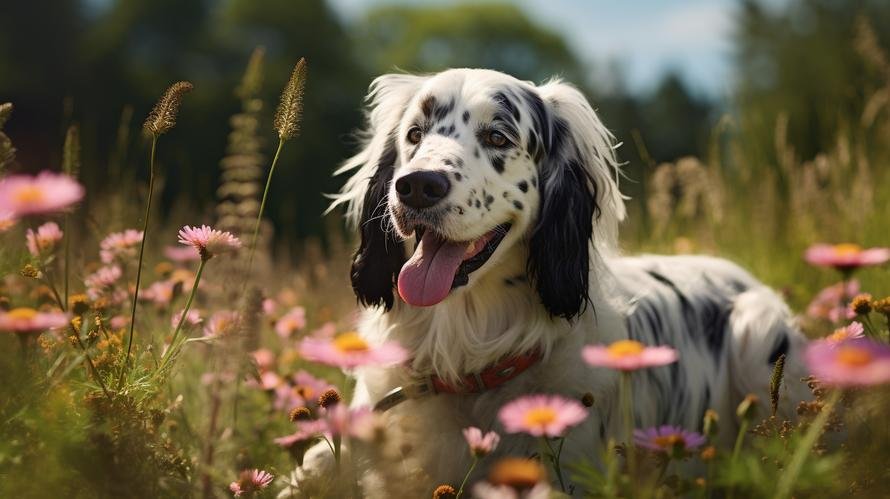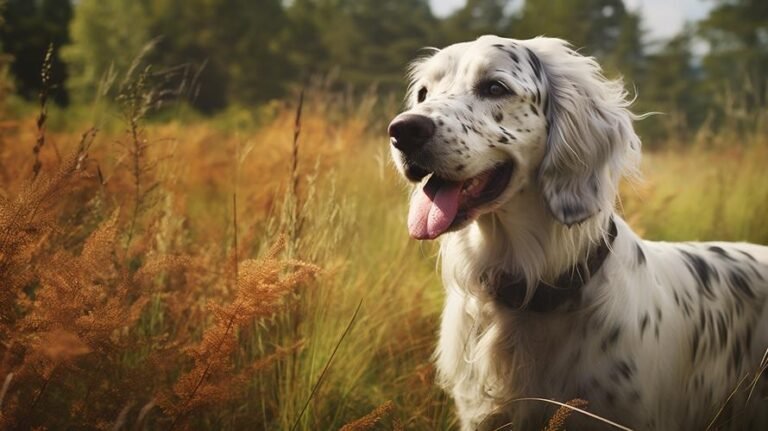Picture this: a sleek, graceful dog with a coat that resembles crackled porcelain, in mottled hues of white, black, and tan. It has delicate feathering on its fringed ears and tail, and impressive stamina that makes it an excellent running partner. This beautiful breed is the English Setter, a classic hunting dog known for its striking looks and gentle temperament. But here’s the clincher – contrary to what you might expect from this athletic canine, the English Setter is far from aggressive.
In fact, the English Setter is known for its friendly demeanor, which is one of the breed’s defining characteristics. This elegant breed is not only extremely gentle and even-tempered but is also a huge fan of children, making it an ideal family pet. While they have the acumen for hunting, the English Setter’s primary goal is not to “catch” the game, but rather to “point” it out with an unmistakable stance that alerts hunters to the nearby presence. This further cements the breed’s reputation as a helper-mate rather than a threatening aggressor.
English Setters are not instinctively aggressive toward other dogs or humans. They are social creatures who love companionship and can certainly cohabitate harmoniously in a multi-pet household. They will welcome guests into your home with a wagging tail, rather than with snarls or intimidation. As with all breeds, early and comprehensive socialization and training are paramount in ensuring a balanced and well-mannered dog. But as it stands, the English Setter is not an inherently aggressive breed.
Nevertheless, it is important to realize that your English Setter, like all dogs, needs mental and physical stimulation to remain content. A bored Setter might resort to chewing up your shoes or landscaping your yard, but even then, they are not likely to exhibit aggression. Regular exercise, interactive dog toys, and mental challenges like puzzle games or training sessions can help ward off any undesired behavior.
Despite their sweet nature, this breed does come with a touch of stubbornness. As hunting dogs, English Setters have an independent streak. This means that it might take a bit of patience on your part during training sessions. It’s not that they’re trying to be difficult; they just have a strong desire to explore and would much rather be hunting out in the field.
Another point worth mentioning is the English Setter’s expressive vocalizations. They can be quite ‘talkative’. But this trait is not categorized as an aggressive behavior but rather as an expression of their emotions or needs. They may express contentment, loneliness, or excitement by barking or howling. And, with their gentle hearts, even their bark is not as terrifying as it sounds.
It’s also important to understand that aggression in dogs, regardless of their breed, is usually a consequence of poor socialization, abuse, neglect, or improper training. So, when rearing a dog, it’s crucial to demonstrate love and kindness, as well as firm consistency during their training. English Setters will respond best to positive reinforcement, and they’ll gleefully give you that love right back.
All in all, the English Setter is a gentle, friendly, and laid-back breed. They may have been bred for hunting, but they certainly don’t hunt for trouble. With their loyal, loving nature and distinctive good looks, the English Setter makes a wonderful pet for those willing to provide them with sufficient exercise, care, and affection. No, they are not aggressive beasts. They are sweet companions, regardless of their noble hunting skills.
To sum up, what makes an English Setter potentially ‘aggressive’ isn’t its breed, it’s its upbringing. However, given the right nurturing environment, the English Setter is far from an antagonistic monster. Instead, it’s a friendly companion, a tireless playmate, and a genuinely sweet soul. You just have to accustom them to feel loved, and the love they give you back will undoubtedly outweigh any complications you may encounter along the way.
Therefore, remember that an English Setter, or any dog for that matter, doesn’t turn aggressive out of the blue. It’s always a result of external circumstances. So, nurture your furry friends with love and patience, and they will turn out to be the best pets you could ever ask for!



